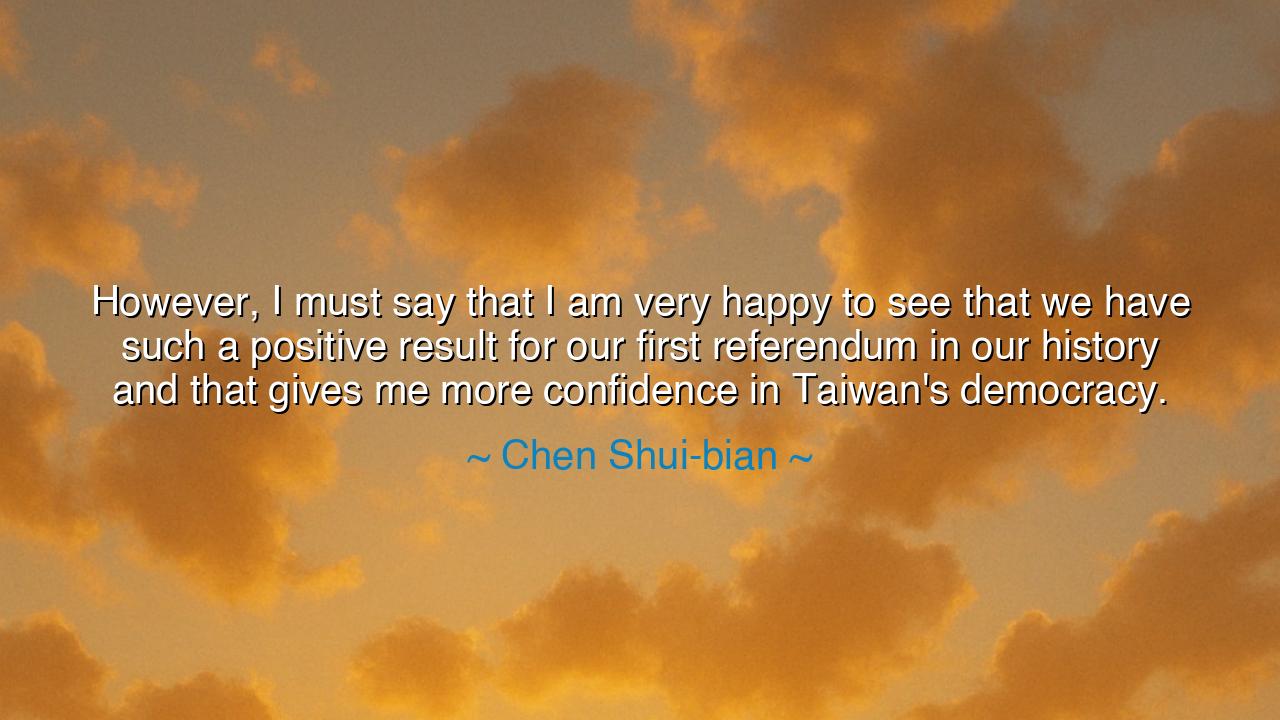
However, I must say that I am very happy to see that we have
However, I must say that I am very happy to see that we have such a positive result for our first referendum in our history and that gives me more confidence in Taiwan's democracy.






The words of Chen Shui-bian, “However, I must say that I am very happy to see that we have such a positive result for our first referendum in our history and that gives me more confidence in Taiwan’s democracy,” resound like the voice of a people stepping into the light of self-determination. They speak not only of numbers tallied on ballots, but of a triumph of spirit—the moment when citizens, by their own hands, shape the destiny of their land. A referendum is more than a vote; it is the people themselves speaking as one, and in their voice lies the heartbeat of freedom.
The origin of these words lies in Taiwan’s long journey from oppression to self-rule. Once bound beneath the weight of authoritarian rule, the island endured years of silence where dissent was punished and choice was denied. Yet the will of the people did not vanish—it endured, waiting for the day when ballots would replace chains, and voices would no longer be whispers in the dark. Chen’s joy in the positive result is thus not just personal, but the echo of generations who yearned for this very moment.
Consider the story of the Athenians in ancient Greece, who first practiced democracy through direct vote. Though imperfect, their assemblies allowed citizens to take part in decisions that shaped their polis. Taiwan, in its own time, carried this ancient torch into the modern age, proving that democracy is not a relic of the past but a living flame. Just as the Athenians declared their right to govern themselves, so too did Taiwan’s people declare their right to speak and to decide.
Chen’s words also carry a heroic hope: that each step toward democracy strengthens the whole. A referendum, though a single act, becomes a seed for future growth. It teaches the people that their voices matter, and it teaches leaders that their power must come from consent, not coercion. In this way, each vote becomes not only a choice about policy, but a proclamation of dignity, freedom, and belonging.
The positive result Chen celebrates is therefore not only about agreement on a question, but about the success of democracy itself—that citizens engaged, participated, and affirmed their right to govern their future. Confidence in Taiwan’s democracy is born not in speeches or laws alone, but in the living action of the people, who show that they are ready to bear the responsibilities of freedom.
Let future generations remember: a referendum is more than parchment and ink; it is the voice of the people rising like a chorus, declaring that their destiny is their own. When such voices unite in a positive result, democracy itself grows stronger, and the spirit of freedom stands taller against the storms of history. For in every vote lies not only decision, but the promise of a brighter dawn.






KHDang Thi Kiem Hong
Chen Shui-bian’s enthusiasm about the positive outcome of Taiwan’s first referendum demonstrates a strong belief in democratic values. However, while the success of this referendum may bring confidence, what challenges remain for Taiwan’s democracy? Can public referendums remain an effective tool for governance, or might they become susceptible to manipulation or populism? What steps can be taken to safeguard the integrity of Taiwan’s democratic processes moving forward?
TDxuan tra do
The excitement Chen Shui-bian expresses about Taiwan’s first referendum result is understandable, as it shows that Taiwan is building a strong democratic tradition. But I also think there’s a need to examine how referendums fit into the larger political landscape. Do they truly reflect the will of the people, or are there underlying issues that need to be addressed to ensure the full democratization of Taiwan?
DHDuc Duy Huynh
Chen Shui-bian’s statement about Taiwan's first referendum is a hopeful reflection of how democracy can work in the country. The positive result is a testament to the growing democratic maturity of Taiwan, but one question remains: how will Taiwan continue to foster public participation in democracy beyond this referendum? What other reforms or measures could further strengthen Taiwan’s democratic processes and ensure the people’s voices are consistently heard?
NYNhi Y
It’s great to see such confidence in Taiwan’s democracy, especially following their first referendum. The positive result indicates that people are engaging with the democratic process, which is always a step forward. However, what will the next steps look like? Will referendums become a regular part of Taiwanese politics, and how will their outcomes influence policy decisions? What does the success of this referendum signal for the future of democracy in Taiwan?
KLNguyen Thi Kim Linh
Chen Shui-bian’s statement seems to show optimism about Taiwan's democratic system, and it’s heartening to see such confidence in the result of the referendum. However, I wonder if Taiwan’s democracy is truly robust enough to withstand external pressures, particularly from countries that may not fully support Taiwan’s autonomy. How does this referendum outcome shape Taiwan’s relationship with other nations in the region?